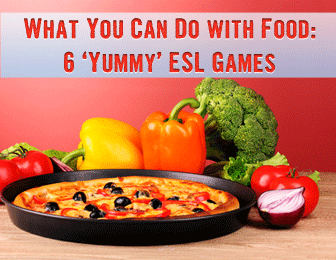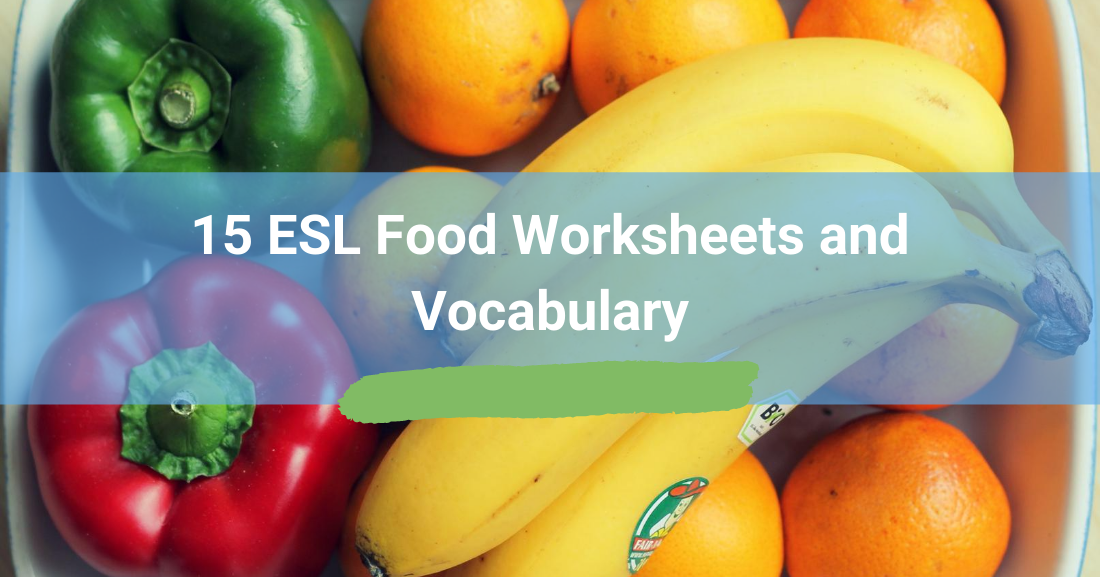What You Can Do with Food: 6 Games Your ESL Students Will Love


Who doesn’t love talking about food? Whether you’re teaching complete beginners or adult students, incorporating conversation and vocabulary about food and drinks is a great way to keep learners engaged in learning new topics. We’ve rounded up 15 food worksheets for all levels, from simple warmers and fillers to role play activities to flashcards.
Oh, and be prepared for some growling tummies by the end of class.

Young Learners in preschool and kindergarten Wells love exploring new food and drink vocabulary. When introducing new subjects to Children of this age, it's best to use tactics like sorting objects, incorporating letters of the alphabet, playing games, and doing Hands-On activities. These specialized approaches to teaching preschoolers and kindergarteners help to keep them engaged, as well as form a foundation of knowledge that they will carry with them throughout the rest of their education. The exercises below are full of colorful, fun visuals that are sure to entice young ones and help them learn food vocabulary. (Keep snacks on hand – they'll get hungry!)
10 Realistic Fruit and Vegetable Flashcards - This food activity is for beginners who are just learning the names of different fruits and veggies, like apple, kiwi, strawberry, banana, cherry, and blueberry. The set of flashcards can be used at home for extra practice or in the classroom to play a matching game.
Ingredients Card Game - Pre-K students probably don’t know much about cooking, but these food flashcards will introduce new vocabulary to them, including the names of common spices and seasonings like salt, pepper, garlic, and onion.
Food Alphabet - This simple worksheet gives students a chance to identify common foods and label them with the correct name. The exercise features images of a cookie, milk, cake, ice cream, and more.
Early Elementary students still benefit from working on activities with lots of visuals, but this is a time where you can start to incorporate more speaking and writing activities, as well. ball role-plays to word searches and flash cards, there are plenty of ways to teach elementary level students about food and all the wonderful things that come along with it—cooking, grocery shopping, and eating.

As students advance in their education, it's important for them to start honing in on their listening and speaking skills. These strategies can apply as you’re incorporating food vocabulary into your lesson plans, whether you decide to do role plays in the classroom, listening comprehension activities, or writing exercises. Middle school and intermediate students love to interact with their peers, so it's always a good idea to come up with group activities to do in class. After wrapping up the following worksheets, feel free to add in class discussions at the end of the exercises to incorporate socialisation and speaking practice into your lesson if it's not already built into it.
Talking about Food - Listening Comprehension - Boost students’ vocabulary with this food activity! There’s a couple videos that accompany the exercise to help students better understand new terms.
Fast Food - Listening, Discussion, and Writing - This activity is all about fast food! What could be better? Students will listen to an audio clip, answer questions, and discuss topics as an entire class or small group.
Cooking Speaking - With this food-related activity, you’ll split up students into groups and have them use the questions provided to start a dialogue about cooking.

Whether you need a filler or warm up activity or a supplement to your nutrition and health class, these food worksheets are great for high school students. These activities incorporate engaging media and conversation to help students learn about a specific topic regarding food. In one activity, students will even be asked to watch an episode of Friends.
Is Coffee Good For You? - Students will be intrigued by the facts they learn about coffee in this activity (and perhaps change their drinking habits!). This is a great exercise for both high school and adult learners.
If you're teaching adult learners about food, you're likely an ESL teacher. We've come up with a few worksheets that are excellent options for adults learning food vocabulary. From Kitchen Bingo to role-plays to speaking activities, these exercises are fun and engaging as well as educational.
If you want more ESL Activities on Food, check out these Top 10 ESL Activities for Teaching a Unit on Food.